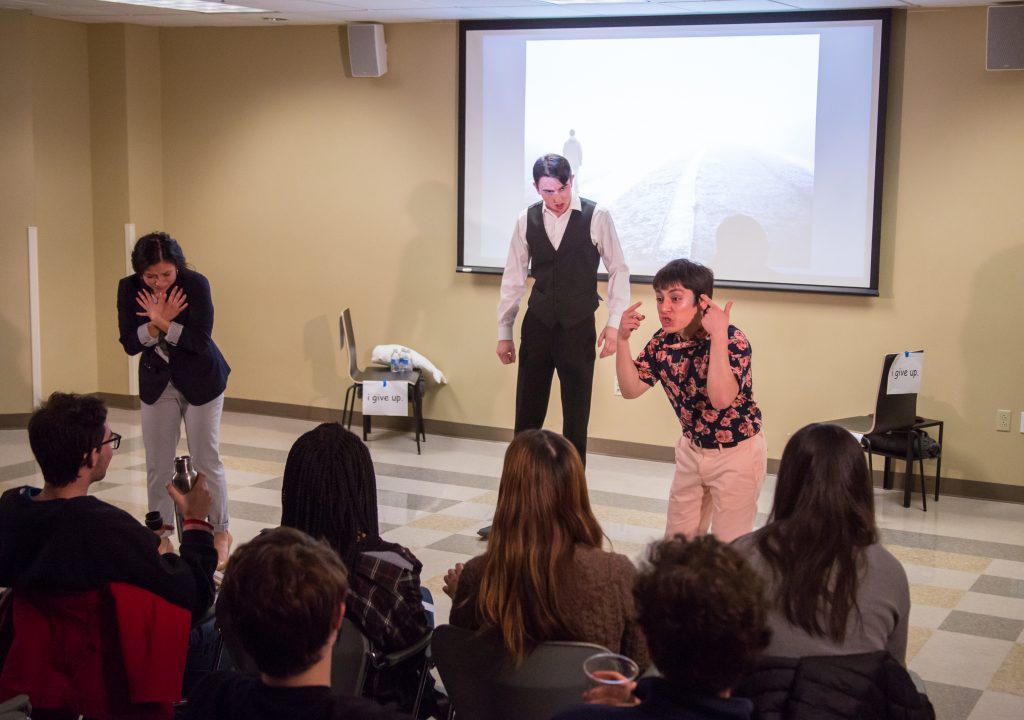Cadenza | Theater
Thyrsus adapts to COVID-19 with radio plays, play-reading group
This semester, student theatre groups are being forced to adapt to these unprecedented times, and Thyrsus is no different.
Thyrsus focuses on student-run experimental theatre. Under normal circumstances, students can participate in “no shames,” monthly writing workshops for student written pieces. Performance opportunities come in the form of Day of Shame, a 24 hour theatre festival featuring student-written monologues and scenes directed and performed by students. However, with the current COVID-19 restrictions, Thyrsus has introduced two new programs that promote the experimental mission: radio plays and Thyreads, a play-reading group.
Sophomore Alexander Hewlett is leading Thyrsus’ radio play projects, which are student-written monologues that are performed and recorded by students in the theatre group. Even in this seemingly perfect socially distant medium, Hewlett explained that they are restricted to “mostly monologue plays right now, which is a bit of a constraint of the way that we can record because you can only have so many people in the studio spaces at once.”
 Grace Bruton | Student Life
Grace Bruton | Student Life Thyrsus students perform a scene from “Pullman, WA” in the Lopata Multipurpose Room last fall.
Even with the restrictions, the experimental aspect is still prevalent. “We’re sort of constantly going to be trying to push the boundaries of what we can do with the medium,” Hewlett said. “We’re trying to make sure that we still keep up the elements of experimentalism, so we want to keep things fresh and new.”
The experimental aspect of radio plays made this new medium a possibility before the pandemic even hit. “Thyrsus is always looking for new projects to make so there’s different mediums and we can get different people involved,” Hewlett noted. “Also, in line with experimentalism, [radio] was sort of a medium that I had never worked with, and a medium that I know a lot of people as actors hadn’t really worked with yet,” he added.
Not only is Thyrsus exploring different mediums of theatre and art, but they are also expanding the way they are engaged with theatre through the new program Thyreads. “Because we can’t be engaging with theatre in the traditional way that we normally do, we’re looking at theatre through more of a literary sense,” said junior Shaelee Comettant, the leader of Thyreads.
Thyreads is a play-reading group that compiles a semesterly reading list of three plays and one multimedia piece, which are connected by theme, genre or form. This semester, the theme is Black Experimentalism, and all of the plays are written by Black artists who alter the typical expectations of viewers.
In monthly meetings, students will “analyze what [the plays] are doing” and “talk about how a play could look on stage, different ways that playmakers could put that play into stage and turn it into work of theater,” Comettant noted. “We’re hoping that students can engage with theatre and works and narratives that they don’t normally engage with at Wash. U.,” she added.
With the discussions surrounding Black Experimentalism, Comettant remarked that the “plays engage with topics that are uncomfortable to talk about and there’s a lot of shame surrounding them.” Having these difficult conversations about race is important, and Thyreads is hoping to “create a level of comfort around being uncomfortable in conversations,” Comettant added.
Despite having to make changes due to the COVID-19 pandemic, Thyrsus is still embracing the experimental aspect of their identity and using it to create theatre through different mediums and to view theatre through a different lens.
